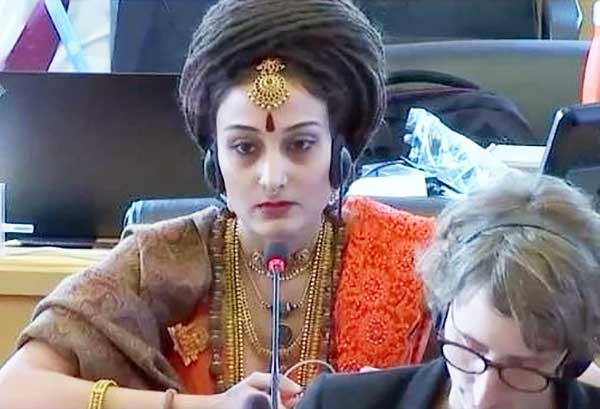Representatives of fugitive self-proclaimed godman Swami Nithyananda's fictional nation of 'Kailasa' have wormed their way into a UN committee's discussion on sustainable development in Geneva creating the false impression that the world organisation has recognised it.
At a general discussion on Sustainable Development held by the Committee on Economic, Social and Cultural Rights (CESCR) on February 24, two persons spoke during the part of the session open to the public claiming to be from the "United States of Kailasa (USK)".
The USK is not among the 193 countries recognised by the UN, which has stringent rules for admission that require the approval of both the Security Council and the General Assembly.
The UN human rights outfits in Geneva are very generous in allowing people to come in and speak at open sessions of their meetings, often drawing charlatans and dubious organisations who make weird claims and the organisations' open procedures allow them to submit presentations that are included in their archives, which make it seem official.
Seldom do real countries that are attacked care to respond as it is acknowledged that the participation of the fringe groups is but a circus and engaging with them will only appear to give them legitimacy.
Charged with rape and abduction and facing a court warrant for his arrest, Nithayananda, fled India in 2019 and later founded what he calls the "nation of Kailasa", an amorphous entity that may be based on an island off the Pacific coast of Central America claiming to represent 2 billion Hindus.
The February 24 meeting took a break from evaluating the reports of countries to have the general discussion featuring experts on sustainable development, legal matters, indigenous people, poverty and labour standards speaking about how the covenant applied to these issues.
The session was chaired by the Committee's head Mohamed Abdel Moneim, and moderated by member Peter Emuze.
The two USK representatives appeared to have gotten in by offering to comment on development issues under discussion.
A woman with heavy make-up wearing a turban, a forehead ornament and necklaces introduced herself with what sounded as Vijayapriya Nithyananda, USK's representative to the UN,
She claimed that under "Supreme Pontiff of Hinduism" Nithayananda, "Kailasa has been implementing the ancient Hindu policies and indigenous solutions that are in alignment with a time-tested Hindu principles" for sustainable development".
She added that in the make-believe country, "the basic necessities of livelihood which is which are food, shelter, clothing, education, medical care, they're all offered for free to all citizens".
Vijayapriya then inserted the propaganda about Nithayananda's "intense persecution and human rights violation for reviving the indigenous traditions and lifestyle and lifestyle of Hinduism".
"And he was even banned from preaching and exiled from his birth country," she added, asking the panel what can be done to help him.
Later a man who identified himself as Ian Kumar claiming to be a small farmer and a USK representative addressed a question to an official panellist, Saima Zia from Pakistan who spoke as an expert on small farmers.
He did not bring up Nithyananda but only asked her about what can be done about "local legislation that might significantly stifle indigenous groups who want to authentically practice their cultural agricultural traditions" -- a problem in the imaginary country.
He was dressed in a yellow kurta and was flanked by two women, both wearing rudraksh malas and necklaces, one also sporting a turban and a pendant on her forehead, adding to the carnival atmosphere around them.
One of the women tried futilely to speak.
None of the panellists responded to their comments or questions.
The CESCR, which operates under the broad umbrella of the Office of the High Commissioner for Human Rights, is a committee of 18 independent experts who monitor the implementation of the International Covenant on Economic, Social and Cultural Rights that enshrines rights to adequate food, adequate housing, education, health, social security, water and sanitation, and work.
The covenant was adopted by the General Assembly in 1966 and was ratified by India in 1979.
Earlier this year, USK submitted a response to an open call for inputs by the Rapporteur on the sexual exploitation of children.
The USK sent in a report about its "Nithyananda Gurukul, the traditional residential education system" which teaches "the 64 vidyas", which it said was shut down by "deep state elements" in 2010.
The rapporteur posted the submission along with those of 12 other organisations in preparation for a report to the Human Rights Council next month.
USK claims the posting is a recognition by the UN of Nithayananda's "persecution".




Mistake that benefits no one: World leaders react to Trump's 'reciprocal tariffs'
As US President Donald Trump signed an executive order on the so-called "reciprocal tariffs," the world reacted sharply against the decision, with some calling it a "mistake that benefits no one" while others called it a violation of Washington's obligations under the World Trade Organization (WTO).
Indian pharmaceutical exports get reprieve from Trump’s reciprocal tariffs
Because of the importance of India’s pharmaceuticals to US healthcare, those exports will get a reprieve from President Donald Trump’s reciprocal tariffs, according to the White House.
India stands less impacted by Trump tariffs than global peers: Industry
As US President Donald Trump announced reciprocal tariffs on dozens of countries, including India, industry experts said on Thursday that it appears India's export competitiveness to the US market stands far less impacted on a relative basis compared to global peers.
IAF pilot killed, another critical as Jaguar fighter jet crashes in Gujarat
An Indian Air Force (IAF) pilot lost his life, while another sustained critical injuries after their two-seater Jaguar fighter jet crashed near Gujarat's Jamnagar Airfield, the IAF confirmed on Thursday.
PM Modi emplanes for Thailand; to attend BIMSTEC summit
Prime Minister Narendra Modi on Thursday emplaned for Thailand on a state visit to attend the 6th BIMSTEC Summit, with his visit also set to bolster bilateral relations between New Delhi and Bangkok.
Tripura CM stresses promoting NE states' potential to attract investment
Tripura Chief Minister Manik Saha on Wednesday said that the development of the communication process and system has generated a lot of investment potential, and therefore, more emphasis should be placed on promotion to attract investors in all the northeastern states.
Tripura has 94,723 Lakhpati Didis; 93,425 women to get similar status soon: Minister
Among the 4,75,582 Self Help Group (SHGs) members in Tripura, 94,723 women emerged as ‘Lakhpati Didis’ through their engagement in various enterprising units and 93,425 more women would be ‘Lakhpati Didis’ soon, Social Welfare and Labour Minister Tinku Roy said.
Bhavan’s Little Learners celebrate annual programme
The Bhavan’s Little Learners, Bordowali celebrated annual programme and organised prize distribution ceremony here at Agartala Rabindra Satabarshiki Bhavan on Wednesday.